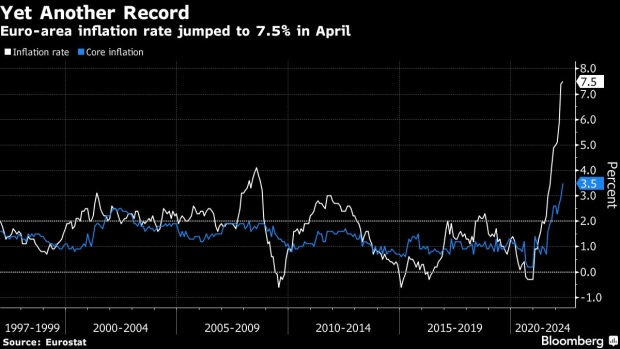May 9, 2022
Lagarde Spurns ECB Staff Plea for Pay Rises Linked to Inflation
, Bloomberg News

(Bloomberg) -- European Central Bank President Christine Lagarde rejected calls by staff to link salary increases to inflation, which has hit a record in the euro area and is far in excess of the minimum pay boost handed out this year.
In an email to employees on May 5, seen by Bloomberg, Lagarde said she understood that some were “disappointed” by this year’s rise but insisted that future adjustments must be “reasonable.”
Responding to arguments by the staff union to link wage increases to consumer-price gains, she said “an indexation of salaries to inflation is not desirable and not intended.”
An ECB spokesperson declined to comment.
Even beyond its own practices, the ECB is among the most vehement opponents of indexation -- a policy that’s still used in some countries but was more widespread decades ago.
When the Governing Council met in October, “it was recalled that stagflation experiences in the 1970s occurred in a different environment, in which indexation allowed wages to react to energy prices and thus sustained both stagnation and inflation,” an account of the discussion showed.
It’s not just the ECB: Soaring prices around the globe are presenting challenges to other central banks, with Bank of England Governor Andrew Bailey saying he won’t take a pay rise this year and most of his staff only getting raises of 1.5%. Central bank workers in Brazil are striking over pay.
Lagarde expressed her sympathy after a meeting last week between the Executive Board and staff representatives to discuss an across-the-board increase in wages of 1.48% that took effect in January.
“I understand that the figure has disappointed many of you because of high inflation,” she wrote in the email. “We understand why inflation is a concern for many of you, as it is for many people outside the ECB.”
Euro-region prices jumped 7.5% in April, compared with the ECB’s 2% medium-term target.
‘Reasonable Adjustments’
The staff union -- known as the International and European Public Services Organization -- has pushed to overhaul the way in which pay rises are calculated, suggesting tying moves to inflation in Germany or the euro zone.
Employees currently rely on a methodology that’s based on salary developments at national central banks and other European institutions, rather than linked to the location where they’re based.
The system is valid through 2023, and a discussion about possible changes should start in the course of that year, according to Lagarde.
Any changes would need to be approved by the Governing Council, made up of leaders of national central banks. They may face an incentive to keep conditions comparable to their own institutions, which hire from the same labor market.
“A stable, reliable methodology should not be abolished, but reasonable adjustments can and shall be discussed,” Lagarde said.
©2022 Bloomberg L.P.






